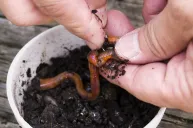If you live in Texas then you may have seen worms wash up on the beaches. Whatever you do, don't touch them. They're called fireworms, and they carry a nasty sting.
Fireworms are marine creatures that resemble something out of a science fiction novel. They're covered in bristles that look like the end of a brush. But these hair-like structures are hollow and full of venom. The Harte Research Institute for Gulf of Mexico Studies at Texas A&M University-Corpus Christi is ringing the alarm bell about the aquatic creature.
They promise that they live up to their name.
"Your worst nightmares are washing up right now in the form of fireworms!" warns a Facebook post from the Harte Research Institute for Gulf of Mexico Studies at Texas A&M-Corpus Christi.
Fireworms On Beaches
"The reason it's called a fireworm is because when it stings you it feels like fire," Jake Tunnel, director of community engagement for the HRI, said. "If you touch it, it can get stuck in your skin very easily and it causes massive pain for about three hours."
So what's so bad about the animal? Well, it's sting is extremely painful, can last hours, and can cause dizziness and confusion. The bristles break off into your skin, injecting venom.
"As far as I know they can't kill you, which I guess is the good news," Tunnell said. Additionally, these worms produce asexually. If you cut one in half then it will produce two worms.
So what happens if you do get stung? Well, Tunnell said that you need to remove the bristles. You should put duct tape over the sting area and rip it off to remove the bristles. However, the pain will probably linger for a while. You can attempt some help for the pain. "You could use vinegar and warm water to see if that helps," he said.
Basically, you can avoid the situation by not touching the animal to begin with. The worms can live up to nine years and live in dark places.
"That's a pretty long time if you think about it for a worm," Tunnel said.




